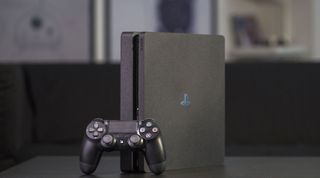The PlayStation 5 won't have much of an impact on the future of PC gaming
Next-generation consoles may help push PC gaming forward, eventually, but PCs are already well on their way.

Are current generation consoles holding PC gaming back, and will the next-gen PlayStation 5 help move PC gaming forward? It's an accusation and theory I've seen many times over the years, and it sounds like such a reasonable statement at first glance. Games are becoming increasingly complex, often costing tens of millions of dollars to create. Developers and publishers want to sell as many copies as possible, which means catering to a wider range of hardware. And with consoles sticking around for five years or more, a lot of games have to be 'watered down' to ensure existing consoles are still able to run them. Or so the reasoning goes.
If you want to look at the future of gaming consoles, all you have to do is look at what's been happening in PC gaming for years.
The problem with the above thinking is that it's not just consoles holding us back. How many PC gamers are actually running state-of-the-art PCs? The Steam Hardware Survey arguably provides the best public snapshot of PC gaming hardware as a whole. Based on the Steam survey, about half of current Steam PCs have a graphics card that's as powerful or better than the GPU in the five-year-old PS4, and 35 percent of Steam GPUs are equal or faster than the PS4 Pro. Plus, 40 percent of surveyed PCs are running CPUs that clock at less than 3GHz, and 82 percent are either 2-core or 4-core processors.
In other words, if consoles are holding PC gaming back at all, they're only part of the equation. Older and slower PCs are also to blame, because they're at least two-thirds of the potential people buying those new, increasingly complex games.
The good news is that the "average gaming PC" is getting faster, too. 13 percent of all surveyed Steam PCs already have GPUs that aren't just equal to the PS4 Pro, but are clearly faster than it. That's roughly 20 million gamers, and the number of PCs in this elite group is growing—it's up two percent since the start of 2019 and will likely hit 20 percent or more of total PC gamers by the end of the year.
By the time the PS5 arrives, over a quarter of gaming PCs could already offer similar performance. So what does the PS5 actually mean for PC gaming?
Basically, it means continued improvements, something that's already happening. Gaming hardware requirements rarely move forward in massive jumps. The arrival of the PS4 and Xbox One didn't immediately kill off the previous generation consoles, no more than Nvidia's RTX cards suddenly outdated all the GTX 10-series hardware. Instead, there's a steady progression toward more complex and more demanding games, spurred on by both PCs and consoles.

Sony's reveal of the PS5 hardware gives us a taste of what's to come (in 18 months or so). It's true that a good PC can deliver equal or better specs today, but games that will actually use all the available hardware, never mind require it, won't show up the day the PS5 launches. Nvidia has been pushing ray tracing for more than nine months now with its RTX cards, and we still only have a handful of games that utilize the technology. As more PCs gamers upgrade and the next generation consoles start shipping, developers will have more incentive to implement all those fancy new features.
The biggest gaming news, reviews and hardware deals
Keep up to date with the most important stories and the best deals, as picked by the PC Gamer team.
But just like the PS3 and PS4 coexisted for a year or two of active support, the arrival of the PS5 next year won't mean an immediate end to the PS4/PS4 Pro. That in turn means ray tracing won't be required but will instead be an extra that you don't get on the older consoles. Just like we're seeing in the PC space right now.
That's arguably the biggest takeaway from the Sony "PS5" announcement. If you want to look at the future of gaming consoles, all you have to do is look at what's been happening in PC gaming for years.
Physical media is going away, digital downloads are the future.
Large SSDs have become affordable enough to replace slow hard drives.
Esoteric designs like the PS3's Cell microprocessor are out, replaced by x86 CPUs—and the Xbox One's funky DDR3 + 32MB ESRAM design was upgraded to the Xbox One X's 12GB of GDDR5.
Instead of becoming increasingly specialized, console hardware is becoming increasingly generic.
It was inevitable. Not only does it take vast resources to engineer faster and better hardware, but reinventing the wheel is hard. Technology trends toward "best" implementations, and the PC has repeatedly proven itself as the best place for hardware companies to experiment. What works gets copied, and what doesn't falls by the wayside. In the end, we all benefit.
Jarred's love of computers dates back to the dark ages when his dad brought home a DOS 2.3 PC and he left his C-64 behind. He eventually built his first custom PC in 1990 with a 286 12MHz, only to discover it was already woefully outdated when Wing Commander was released a few months later. He holds a BS in Computer Science from Brigham Young University and has been working as a tech journalist since 2004, writing for AnandTech, Maximum PC, and PC Gamer. From the first S3 Virge '3D decelerators' to today's GPUs, Jarred keeps up with all the latest graphics trends and is the one to ask about game performance.
Most Popular

